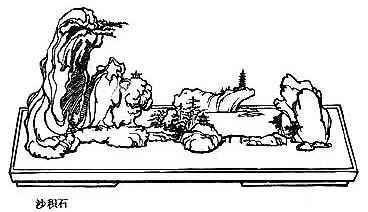道
德
經
Dao De Jing 
 – De la Voie et de la Vertu
– De la Voie et de la Vertu
La dialectique naturaliste et politique de Lao-tseu exposée en 81 textes poétiques et obscurs. Tr. Julien (fr), Waley (en), Wilhelm (de) et Lau (en).
| 1 | 2 | 3 | 4 | 5 | 6 | 7 | 8 | 9 | 10 | 11 | 12 | 13 | 14 | 15 | 16 | 17 | 18 | 19 | 20 | 21 | 22 | 23 | 24 | 25 | 26 | 27 | ||
| 28 | 29 | 30 | 31 | 32 | 33 | 34 | 35 | 36 | 37 | 38 | 39 | 40 | 41 | 42 | 43 | 44 | 45 | 46 | 47 | 48 | 49 | 50 | 51 | 52 | 53 | 54 | ||
| 55 | 56 | 57 | 58 | 59 | 60 | 61 | 62 | 63 | 64 | 65 | 66 | 67 | 68 | 69 | 70 | 71 | 72 | 73 | 74 | 75 | 76 | 77 | 78 | 79 | 80 | 81 |
Daodejing II. 63.
第 六 十 三 Section De – Chapitre LXIII
(Le sage) pratique le non-agir, il s'occupe de la non-occupation, et savoure ce qui est sans saveur.
Les choses grandes ou petites, nombreuses ou rares, (sont égales à ses yeux).
Il venge ses injures par des bienfaits.
Il commence par des choses aisées, lorsqu'il en médite de difficiles ; par de petites choses, lorsqu'il en projette de grandes.
Les choses les plus difficiles du monde on nécessairement commencé par être aisées.
Les choses les plus grandes du monde ont nécessairement commencé par être petites.
De là vient que, jusqu'à la fin, le Saint ne cherche point à faire de grandes choses ; c'est pourquoi il peut accomplir de grandes choses.
Celui qui promet à la légère tient rarement sa parole.
Celui qui trouve beaucoup de choses faciles éprouve nécessairement de grand difficultés.
De là vient que le Saint trouve tout difficile ; c'est pourquoi, jusqu'au terme de sa vie, il n'éprouve nulles difficultés.
Julien 63
It acts without action, does without doing, finds flavour in what is flavourless,
Can make the small great and the few many,
“Requites injuries with good deeds,
Deals with the hard while it is still easy,
With the great while it is still small.”
In the governance of empire everything difficult must be dealt with while it is still easy,
Everything great must be dealt with while it is still small.
Therefore the Sage never has to deal with the great; and so achieves greatness.
But again “Light assent inspires little confidence
And 'many easies' means many a hard.”
Therefore the Sage knows too how to make the easy difficult, and by doing so avoid all difficulties!
Waley 63
以无为为居, 以无言为教, 以恬淡为味。事不论大小多少, 要始终抱着抱怨以德的态度来处理。
处理难事要从简单的地方入手, 处理大事要从细微的地方做起。因此, 圣人永远不自吹做大事, 从不好高骛远, 然而却能建立伟业。
轻许诺言必然失信。想得越容易, 遇到底困难也越多, 圣人总多想困难和问题并很周到地考虑了解决问题的方法, 因而反到不难。
白话翻译
Wer das Nichthandeln übt,
sich mit Beschäftigungslosigkeit beschäftigt,
Geschmack findet an dem, was nicht schmeckt:
der sieht das Große im Kleinen und das Viele im Wenigen.
Er vergilt Groll durch LEBEN.
Plane das Schwierige da, wo es noch leicht ist !
Tue das Große da, wo es noch klein ist !
Alles Schwere auf Erden beginnt stets als Leichtes.
Alles Große auf Erden beginnt stets als Kleines.
Darum: Tut der Berufene nie etwas Großes,
so kann es seine großen Taten vollenden.
Wer leicht verspricht,
hält sicher selten Wort.
Wer vieles leicht nimmt,
hat sicher viele Schwierigkeiten.
Darum: Bedenkt der Berufene die Schwierigkeiten,
so hat er nie Schwierigkeiten.
Wilhelm 63
Do that which consists in taking no action;
Pursue that which is not meddlesome;
Savor that which has no flavor.
Make the small big and the few many;
Do good to him who has done you an injury.
Lay plans for the accomplishment of the difficult before it becomesdifficult;
Make something big by starting with it when small.
Difficult things in the word must needs have their beginnings in theeasy;
Big things must needs have their beginnings in the small.
Therefore it is because the sage never attempts to be great that hesucceeds in becoming great.
One who makes promises rashly rarely keeps good faith;
One who is in the habit of considering things easy meets with frequentdifficulties.
Therefore even the sage treats some things as difficult.
That is why in the end no difficulties can get the better of him.
Lau 63

De la Voie et de la Vertu – Dao De Jing II. 63. – Chinois on/off – Français/English
Alias Daode Jing, Dao De Jing, Tao Te Ching, Tao Teh Ching, le Tao-tö-king, Lao-Tzu Te-Tao Ching, the Laozi, Lao Zi, the Lao Tze, le Lao-tseu, The Book of the Way and its Virtue, the Way and its Power.
Le Canon des Poèmes, Les Entretiens, La Grande Étude, Le Juste Milieu, Les Trois Caractères, Le Livre des Mutations, De la Voie et la Vertu, 300 poèmes Tang, L'Art de la guerre, Trente-six stratagèmes
Bienvenue, aide, notes, introduction, table.
Index – Contact – Haut de page
